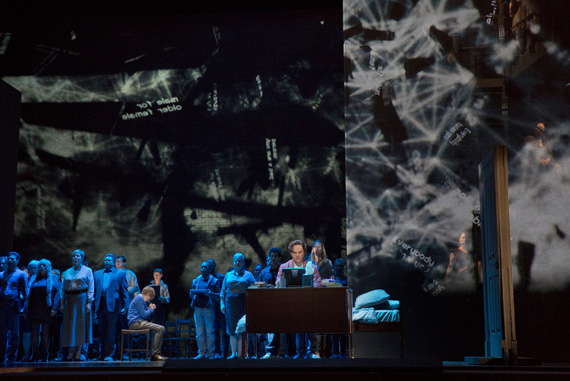Two Boys

(© Ken Howard/Metropolitan Opera)
Oh, to return to that magical time when the Internet was still in its wild adolescence. This was long before Facebook and Twitter. I’m talking about the turn of the millennium, when Yahoo! chat rooms and chance meetings with random strangers (of dubious identity) were still the norm for web-connected millennials across the world (and our parents were still too computer-illiterate to do anything about it). That’s the setting of Nico Muhly’s Two Boys, which is receiving its American premiere at the Metropolitan Opera after its 2011 debut with London’s English National Opera. It’s a gripping two hours of mystery and scandal, set to a challenging and staggeringly beautiful score. Under the direction of Barlett Sher (Le Comte Ory), the Internet is a living, breathing entity onstage, as alluring as it is dangerous.
The story is based on a real-life stabbing that occurred in Manchester, England, in 2003. You can read the lurid details of how a 14-year-old boy assumed multiple identities over the Internet in an elaborate suicide plot in this 2005 Vanity Fair article. It inspired Jordan Seavey’s 2007 play 6969 and continues to beguile to this day. Lest you think it’s all too farfetched (“What was that stupid boy thinking?!?!?”), need I remind you that teenage boys and Broadway producers alike have been shipwrecked after following the siren call of Internet phantoms. Wishful thinking and self-delusion are powerful forces that technology only seems to augment.
Set in an industrial city in England during March 2001, Two Boys starts with the stabbing and goes back to investigate the evidence. As the audience enters the theater, we watch video surveillance of the shopping mall in which the crime occurred. Much of the opera takes place in the office of Detective Anne Strawson (the strong-voiced and sympathetic Alice Coote) as she interviews attempted-murder suspect Brian (Paul Appleby, looking perfectly awkward, as a 16-year-old dork should) and pours over chat transcripts. It’s like Equus, but with much higher stakes.
Brian is a bored and thoroughly average teenager with a serious chatroom addiction. He recalls how he met his Internet girlfriend, the beautiful and rich Rebecca (Jennifer Zetlan) in a group chat. As Brian follows Rebecca down the rabbit hole, he comes in contact with a cast of characters connected to her, including her computer genius brother Jake (Christopher Bolduc), their MI5-agent aunt Fiona (Sandra Piques Eddy), and their psychopathic gardener Peter (creepy, creepy Keith Miller). A convoluted plot, fit for a spy movie, eventually motivates Brian to carry out his brutal crime.
While this is ostensibly an English opera, Craig Lucas (The Light in the Piazza, also directed by Sher) has written much of the libretto in “chat,” the lexicon of abbreviations and acronyms that serve as the vernacular of the Internet. As the actors sing, their words are projected on chat windows upstage. Brian chat-sings, “Can i c u?” Jake replies, “In the ICU? [Lol] Gotta laugh.” These seemingly lazy throwaway lines betray a deep desire to connect, while at the same time staying safely guarded behind a computer screen. (j/k…but really yes.) It is a clever and authentic form of speech that offers Muhly endless opportunities for overlapping and interweaving lyrics, mirroring the dissonance of a big Internet chat room.
With its repetitive and foreboding strings, Muhly’s score puts Two Boys squarely in the same play world as Notes on a Scandal, an environment in which intrigue and a distinctly British variety of loneliness thrive. Beyond the obvious Philip Glass comparisons, Muhly’s score, with its fluttering woodwinds and high-flying chorales, also contains hints of John Adams and medieval Christian music. Conductor David Robertson holds this ambitious pastiche together like so much glue. He’s unflappable.
The chorus scenes are breathtaking. Muhly has set Lucas’ endless river of sexually charged chat-room filth to gorgeous, dynamic, and complex music. Andrew Pulver’s ringing soprano soars over an ecclesiastical harmony fit for a grand cathedral. Suddenly, a minor strain infects the chord and spreads like a virus, as increasingly ominous bass notes assert themselves from below. At the same time, Hofesh Shechter’s wild, uncontrollable, but precise choreography spreads across the stage, pulling more and more innocent choristers into its collective anarchy. The Borg have arrived and they are us: the denizens of the Internet. Resistance is futile.
Perhaps the most stunning aspect of Two Boys are the projections and animations created by 59 Productions. Thousands of tiny chat windows fly through space and are lost forever. A complex web of computers spirals across the stage, always changing and growing. It feels as though one is looking at the physical manifestation of the Internet, an all-encompassing being with the power to connect people in love, business, companionship, and death. This is the many-armed God of the 21st century, simultaneously beautiful and terrifying.











